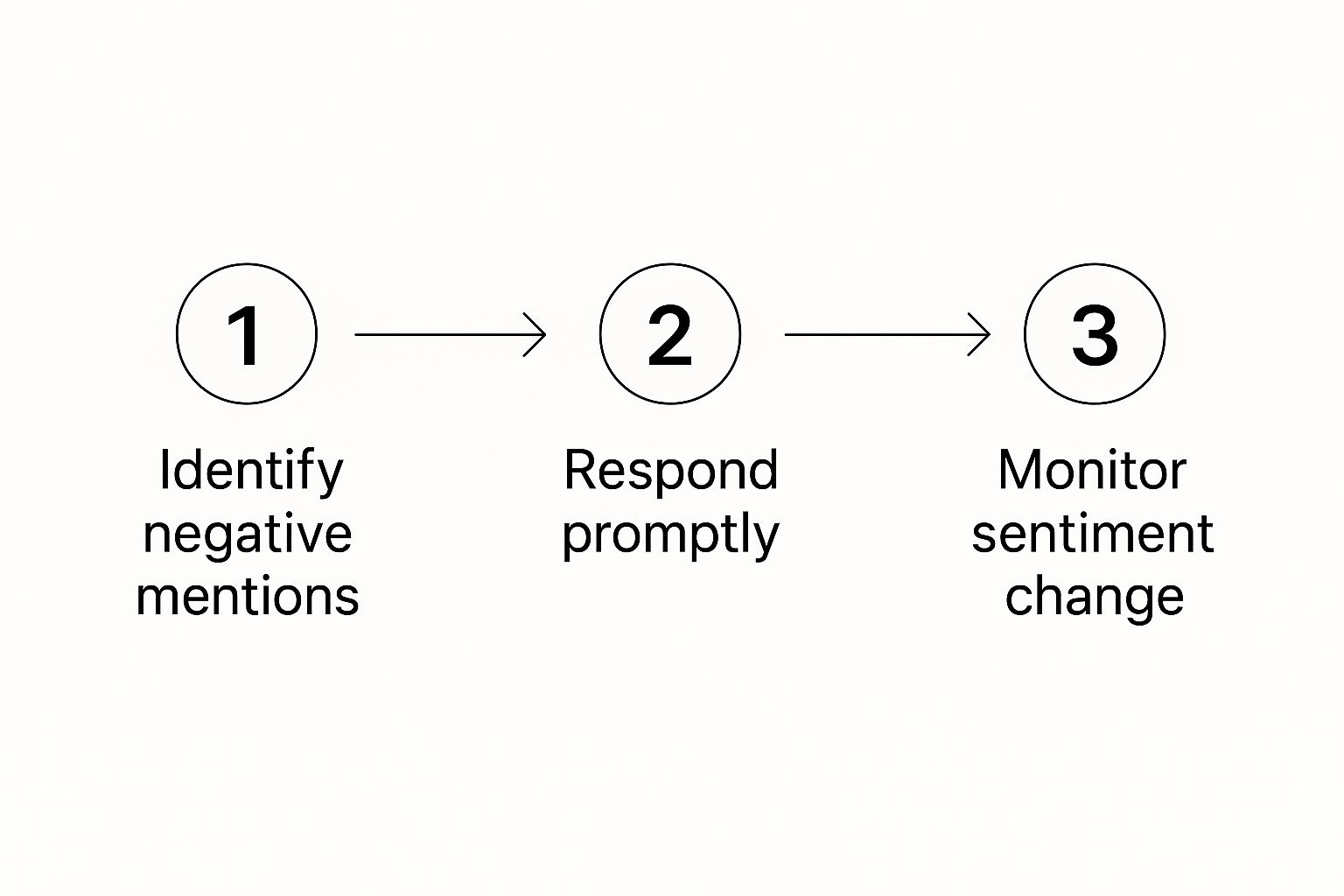
Repair Online Reputation: Proven Strategies for UK Businesses
The Real Impact of Digital Reputation on UK Businesses

In the interconnected UK marketplace, your online reputation is the first impression for potential customers. This digital footprint, encompassing reviews, social media activity, and search results, heavily influences consumer trust and your bottom line. Imagine a potential customer searching for "financial advisor London." The results reveal not only your website but also reviews, news articles, and social media discussions, shaping their perception before they even click.
This digital presence is paramount. Proactively managing your online reputation is as crucial as managing your finances or operations. A negative online reputation can significantly hinder growth, making it challenging to acquire new customers and retain existing ones. It also impacts recruitment and funding opportunities.
How Online Reputation Affects Purchasing Decisions
Online reviews hold immense power, often surpassing traditional advertising. 98% of people read reviews, and nearly three-quarters have written one in the past year. A staggering 94% of consumers say an online review has convinced them not to buy a product or service, highlighting the potent impact of negativity. Find more detailed statistics here. For a deeper dive into reputation management, explore this helpful resource: How to master your online reputation management strategy.
The Financial Implications of a Damaged Reputation
The cost of a tarnished online reputation goes beyond lost sales. A negative digital presence can inflate customer acquisition costs, depress conversion rates, and even diminish business valuation. Constantly addressing negative reviews or engaging in damage control consumes valuable resources. These resources could otherwise be channeled towards growth and innovation. Furthermore, a damaged reputation can make securing funding or attracting investors much more difficult.
Building a Resilient Online Reputation
Building a robust online reputation demands a proactive and comprehensive strategy.
- Actively monitor online mentions
- Respond to reviews, both positive and negative
- Create positive content showcasing your expertise and values
- Address negative content strategically
- Build relationships with influencers and journalists
By prioritizing online reputation management, UK businesses can safeguard their brand, attract customers, and flourish in today's competitive market.
Conducting a No-Nonsense Reputation Audit
Before you embark on the journey of repairing your online reputation, it's essential to understand where you currently stand. This understanding begins with a reputation audit, a thorough assessment that reveals the true nature of your online presence. Think of it like a financial audit, but instead of scrutinizing your accounts, you're examining your digital footprint. This audit forms the bedrock of any successful reputation repair strategy.
Auditing Key Platforms and Content
Your reputation audit should encompass all the major online platforms where your business exists, and where conversations about your brand might be happening. Consider it a digital detective investigation, uncovering every clue about your online presence.
-
Search Engines: What shows up on the first few pages of Google, Bing, and other search engines when someone searches for your brand name or core services? Negative articles, reviews, or forum posts appearing prominently can inflict serious damage on your reputation.
-
Review Platforms: Websites like Google My Business, Trustpilot, Yelp, and industry-specific review sites wield significant influence over consumer perceptions. Analyze both the quantity and the sentiment of your reviews.
-
Social Media: Explore mentions of your brand on platforms like Twitter, Facebook, and Instagram. Pay close attention to both direct mentions (@yourbrand) and hashtags relevant to your business or industry (#yourindustry).
-
News and Media: Investigate any news articles, blog posts, or press releases mentioning your business, particularly those with a negative slant.

This infographic illustrates the crucial steps in managing online mentions: identifying negative content, responding promptly and professionally, and monitoring the resulting shifts in sentiment. These three interconnected actions create a continuous cycle for maintaining a positive online presence.
Documenting and Prioritizing Issues
After gathering data from these platforms, it's vital to document and categorize any negative content or recurring patterns. For instance, are there numerous complaints about customer service or product quality? This documentation allows you to prioritize which issues require immediate attention.
Prioritization should consider both the visibility of the negative content (e.g., a negative review on Google's first page takes precedence over a hidden forum post) and its potential business impact (e.g., an accusation of unethical practices is more damaging than a minor website critique). Addressing the most visible and impactful issues first will help you make the biggest difference quickly.
To help guide your assessment, use the following checklist:
Online Reputation Assessment Checklist
A comprehensive checklist of platforms and content types to review when assessing your current online reputation.
| Platform/Content Type | What to Look For | Priority Level | Action Required |
|---|---|---|---|
| Search Engines (Google, Bing) | Negative articles, reviews, blog posts on the first 3 pages | High | Develop a strategy to push down negative content and promote positive content |
| Review Sites (Yelp, Trustpilot, Google My Business) | Volume and sentiment of reviews, responses to reviews | High | Address negative reviews professionally and encourage positive reviews |
| Social Media (Twitter, Facebook, Instagram) | Brand mentions, hashtag discussions, sentiment of comments | Medium | Engage in positive conversations, address negative comments constructively |
| News and Media Outlets | News articles, blog posts, press releases mentioning your brand | Medium | Issue press releases or contact journalists to correct inaccuracies or offer alternative perspectives |
| Forums and Discussion Boards | Negative threads or comments about your brand | Low-Medium (depending on forum popularity) | Participate in discussions to address concerns and offer solutions |
| Blogs and Websites | Negative reviews, blog posts, articles about your brand | Low-Medium (depending on website authority) | Contact website owners to request corrections or removal of inaccurate information |
By systematically reviewing these key areas, you can gain a comprehensive understanding of your online reputation and identify areas for improvement.
Utilizing Reputation Monitoring Tools
Manual searches can be helpful, but several free and paid tools can streamline the reputation audit process. Google Alerts, for example, can notify you of online brand mentions. For a more comprehensive solution, explore professional reputation management platforms. These platforms offer features like sentiment analysis and automated reporting, allowing you to track your progress and identify emerging threats in real-time.
Rebuilding Trust Through Authentic Engagement

In the UK, regaining trust after a reputational setback requires more than just words. It demands genuine, demonstrable action and interaction. It’s about showing, not just telling. This shift reflects how UK consumers now build trust, increasingly relying on peer reviews and authentic online exchanges. Genuine engagement is now essential for reputation repair.
Acknowledging Mistakes and Demonstrating Commitment
The first step towards reputation recovery is openly and honestly acknowledging any missteps. This shows accountability and a willingness to learn from mistakes. For example, if a product recall is necessary, communicate the issue clearly. Explain the steps being taken to rectify the problem and how future occurrences will be prevented.
Highlighting improvements, such as enhanced customer service training or revised product development, reinforces this commitment to positive change. These are tangible steps that lay the foundation for rebuilding trust.
Developing an Authentic Brand Voice
Connecting with UK consumers requires cultivating an authentic brand voice. This involves communicating with transparency and sincerity, letting the human side of your business shine through. Avoid overly promotional language; instead, prioritize genuine dialogue.
This fosters a sense of connection, making your brand more relatable and building rapport with your audience. Authenticity humanizes your brand, making it more approachable and trustworthy.
Engaging Meaningfully Across Platforms
Engaging meaningfully across various platforms is vital for reaching your target audience and managing your online narrative. Respond promptly and thoughtfully to all feedback, both positive and negative. This shows that you value your customers and are committed to their satisfaction.
This type of engagement can transform critics into advocates and build a supportive community around your brand. A report on UK consumer behaviour reveals that online reviews now hold more sway than traditional media. Learn more about what's influencing UK consumer decisions here. You might also be interested in: How to master social media in PR. This emphasizes the importance of active engagement in the digital sphere.
The Psychology of Effective Response Strategies
Understanding the psychology behind responding to feedback is crucial for successful reputation management. For positive feedback, express sincere gratitude and highlight the specific aspects appreciated. For negative feedback, empathize with the customer's experience, offer a genuine apology, and propose a solution.
This demonstrates that you are listening and actively working to resolve issues. It diffuses negative situations and shows your dedication to customer satisfaction. These strategies are powerful tools for rebuilding trust by showing empathy and a genuine desire to improve.
Creating Content That Transforms Your Digital Identity
Building a positive online presence takes dedication and a strategic approach. Think of your online reputation as a garden. Negative content acts like weeds, choking the life out of your digital image. Strategic content creation is the tool you use to cultivate a thriving online presence, one that flourishes with positive content and builds trust with your UK audience. It's not about hiding the weeds, it's about creating an environment where they simply can't compete.
Choosing the Right Content Formats
Just as different plants thrive in different conditions, various content formats serve unique purposes in reputation repair. Blog posts, for instance, establish your expertise and provide valuable insights to your audience. Case studies offer tangible proof of your capabilities by showcasing real-world success stories. Meanwhile, videos create a personal connection, letting your audience see the human side of your brand.
- Blog posts: Establish expertise and share valuable information
- Case studies: Demonstrate real-world success and build credibility
- Videos: Foster personal connections and build trust
- Thought leadership pieces: Position you as an industry authority
Authentic engagement is key, and exploring proven community engagement strategies can significantly enhance your connection with your audience. Choosing the right format to address specific reputation challenges is crucial. If negative reviews mention poor customer service, for example, consider video testimonials highlighting positive customer experiences. This allows you to directly address concerns and build a more balanced narrative.
To help you determine the optimal approach for your reputation goals, we've compiled a comparison of different content formats:
Content Types for Reputation Repair
| Content Type | Best For | Time Investment | Typical Results | UK Audience Receptivity |
|---|---|---|---|---|
| Blog Posts | Establishing Expertise, Sharing Insights | Moderate | Increased Website Traffic, Improved SEO | High, especially for informative and well-researched content |
| Case Studies | Demonstrating Success, Building Credibility | High | Lead Generation, Improved Conversion Rates | High, when relevant to the audience's needs |
| Videos | Building Personal Connections, Showcasing Authenticity | Moderate to High | Increased Engagement, Improved Brand Perception | High, especially for shorter, visually appealing content |
| Thought Leadership Articles | Positioning as an Industry Expert, Influencing Opinions | High | Increased Brand Authority, Media Coverage | Moderate to High, depending on the industry and topic |
This table provides a snapshot of how different content types can be used to enhance your reputation management strategy. Consider your specific goals and resources when making your selections.
Keyword Research and SEO for the UK Market
Understanding how your target audience searches for information is paramount. Keyword research reveals the specific terms potential customers in the UK use when seeking products or services like yours. This knowledge is crucial for crafting content that resonates and ranks well in search results. For instance, a financial advisor in London facing negative reviews might target keywords like "best financial advisor London" or "trusted financial advice UK." This strategic use of keywords helps your positive content rank higher, pushing down negative search results and presenting a more positive first impression to potential clients.
Content Calendars and Distribution Strategies
Consistency is key to successful reputation management. A content calendar serves as your roadmap, guiding your content creation and distribution efforts. It helps you stay organized, maintain a consistent brand message, and ensure your content remains targeted. Distributing your content strategically is equally vital. Promoting it across relevant platforms, from social media and industry forums to email newsletters, expands your reach and maximizes impact. This multifaceted approach helps you build a powerful and resilient online presence.
Building Authority and Repairing Reputation
Repairing your online reputation is a journey, not a sprint. Every piece of high-quality content you create acts like a building block, strengthening your digital foundation. By strategically crafting and distributing valuable content, you not only address reputation challenges head-on but also cultivate a positive brand image that resonates with your UK audience. This systematic approach strengthens your credibility and positions you as a trusted authority in your field, transforming your digital identity from one of doubt to one of confidence.
Mastering Review Management For Reputation Recovery

Reviews are the foundation of a solid online reputation, significantly influencing consumer choices in the UK. This section offers a practical guide to transforming your review profile into a powerful asset, helping you rebuild and strengthen your online presence. Think of reviews as your digital storefront—they are often the first impression for potential customers.
Generating Positive Reviews Ethically
Building a positive review profile starts with encouraging genuine feedback. It's vital to do this ethically, avoiding any practices that violate platform policies, such as incentivizing reviews. Instead, concentrate on delivering outstanding service and experiences that naturally motivate customers to share their satisfaction.
- Provide outstanding customer service: Exceed expectations and make every interaction memorable. This creates a positive impression that encourages customers to share their experiences.
- Simplify the review process: Provide direct links or QR codes to make leaving reviews effortless. Removing friction makes it more likely for satisfied customers to share their feedback.
- Personalise follow-up communication: A simple "thank you" after a purchase or service builds rapport and encourages customers to leave a review. This personal touch shows you value their business.
Responding To Criticism Constructively
Negative reviews are a part of doing business. How you handle these criticisms demonstrates your commitment to customer satisfaction and can be a turning point in reputation recovery. Respond thoughtfully and professionally to all reviews, demonstrating your commitment to continuous improvement.
- Acknowledge the feedback: Thank the reviewer for sharing their experience, even if it's negative. This shows you value all feedback.
- Empathise with their concerns: Acknowledge their perspective and show genuine understanding. Empathy can de-escalate negative situations and build bridges with dissatisfied customers.
- Offer a solution: Propose a concrete action to address the issue. This demonstrates your proactive approach to problem-solving and commitment to customer satisfaction.
- Take the conversation offline: For complex issues, offer to contact the reviewer directly. This allows for a more personal and detailed discussion, potentially leading to a resolution.
Leveraging Positive Feedback Across Marketing Channels
Positive reviews are valuable marketing assets. Amplify their impact by showcasing them across multiple channels, reinforcing your positive reputation and building trust with potential customers.
- Feature testimonials on your website: Display positive reviews prominently on your homepage or a dedicated testimonials page to build credibility and social proof.
- Share positive feedback on social media: Highlight positive reviews on your social media platforms to reach a wider audience and showcase your excellent customer service.
- Include reviews in email marketing campaigns: Build trust and encourage conversions by incorporating positive reviews in your email marketing efforts.
UK-Specific Review Platforms And Strategies
While global platforms like Google, Yelp, and Trustpilot are important, consider UK-specific platforms relevant to your industry. Researching these niche review sites can provide valuable insights for targeted reputation management. You might be interested in: How to master local SEO for small businesses. Focusing on these platforms can significantly enhance your visibility and credibility within your target market.
Measuring Review Sentiment And Benchmarking
Tracking review sentiment over time helps you understand trends and assess the effectiveness of your reputation management efforts. Sentiment analysis software can automate this process. Benchmarking against competitors helps identify areas for improvement and maintain a competitive edge. This continuous analysis is crucial for building a strong online reputation and achieving long-term success. Consistently monitoring and analysing review data allows you to transform your review profile into a powerful driver for growth.
Navigating UK Legal Frameworks for Reputation Protection
Understanding the UK's legal landscape for online reputation management gives you powerful tools. It empowers you to take control of your online presence and protect your brand. This isn't about silencing valid criticism; it's about strategically addressing genuinely harmful content. It's about building a stronger, more resilient online presence.
Defamation, Privacy, and the Right to Be Forgotten
UK law provides several avenues for safeguarding your reputation. Defamation law offers a course of action against false and damaging statements. These statements must be proven to harm your reputation. This includes libel (written defamation) and slander (spoken defamation). For example, a fabricated online review falsely accusing your business of unlawful activity could be grounds for a defamation claim.
Privacy rights, protected by the Human Rights Act 1998 and the UK GDPR, shield individuals from unwarranted intrusions into their private lives. This is particularly relevant when dealing with the release of sensitive personal information. This information, if published, could significantly damage an individual's reputation.
The right to be forgotten, derived from the UK GDPR, allows individuals to request removal of outdated or irrelevant information from search engine results. This can be invaluable for removing old, negative content that no longer reflects your current reality. Effective review management includes thoughtful responses to negative feedback. Find expert tips on responding to negative reviews.
When and How to Pursue Legal Action
Legal action should be a last resort, but a powerful one when necessary. Before taking legal steps, gather all evidence of the harmful content. This includes screenshots, URLs, and dates of publication. Consult with a solicitor specializing in defamation and online reputation. This consultation will help assess the strength of your case.
Balancing Legitimate Criticism With Harmful Content
Not all negative content is eligible for removal under UK law. Legitimate criticism, even if harsh, is typically protected as freedom of expression. The crucial difference is distinguishing between genuine feedback and malicious falsehoods. A negative review detailing a genuine negative customer experience is likely protected speech. A fabricated review falsely accusing a business of fraud is not. Careful assessment and professional legal advice are essential.
Working Effectively With Legal Professionals
Working closely with your legal team is critical for navigating the complexities of online reputation repair. Provide all requested information and documents promptly. Maintain open communication with your solicitor. Their guidance is vital for ensuring you take the appropriate legal steps while protecting your rights.
Practical Steps Within Legal Boundaries
You can take several proactive steps, within legal boundaries, to protect your online reputation:
- Send a cease and desist letter: This formally requests the removal of the damaging content.
- Negotiate with the content publisher: A mutually agreeable solution can often be found through direct dialogue.
- File a complaint with the platform: Many online platforms have established policies against defamatory content. They will investigate valid complaints.
These actions demonstrate a proactive commitment to protecting your reputation. They can often resolve issues before formal legal proceedings are needed. By understanding and employing the legal frameworks available within the UK, you can effectively safeguard your online reputation.
From Repair To Long-Term Reputation Excellence
Repairing your online reputation isn't the end goal; it's a stepping stone on a continuous journey of improvement. This involves shifting from a reactive, quick-fix mindset to a proactive approach, one that cultivates long-term reputation excellence. This proactive stance safeguards the progress you’ve worked hard to achieve, building resilience and solidifying your brand as a trusted entity in the UK market.
Establishing Key Performance Indicators (KPIs)
Just like tracking your financial performance, monitoring your reputation’s health requires meaningful Key Performance Indicators (KPIs). These metrics provide a concrete evaluation of your reputation's strength, highlighting both successes and areas needing attention. This empowers you to chart your progress and spot emerging trends.
-
Sentiment Analysis: This gauges the overall tone of online discussions surrounding your brand. Are mentions largely positive, negative, or neutral? This provides a valuable overview of public perception.
-
Review Scores: Keep a close eye on average ratings and the volume of reviews across various platforms. These offer direct insights into customer satisfaction.
-
Search Positioning: Where does your brand appear in search results for relevant keywords? Aim for high visibility of positive content to shape the narrative.
-
Brand Mention Quality: Evaluate the credibility and influence of sources mentioning your brand. Are they respected industry publications or less reputable forums? Understanding the source is key.
These KPIs offer a comprehensive overview of your online reputation, allowing for data-driven decisions and continuous improvement.
Early Warning Systems and Response Protocols
Think of a fire alarm: it alerts you to danger before it becomes a catastrophe. Similarly, smart reputation management relies on early warning systems that identify potential threats before they escalate.
-
Social Listening Tools: Use tools like Brand24 to monitor social media and online forums for mentions of your brand, competitors, and industry terms. This allows you to address negative sentiment proactively.
-
Automated Alerts: Set up alerts for sudden increases in negative mentions or shifts in review scores. This provides immediate notification of potential issues, allowing for swift action.
A well-defined response protocol is essential for handling reputation threats effectively. This protocol should clearly outline:
-
Designated Spokesperson: Identify the individual authorized to communicate on behalf of your brand during a crisis. Consistent messaging is paramount.
-
Communication Channels: Determine the appropriate platforms for addressing various issues (e.g., social media for customer service concerns, a press release for major incidents).
-
Key Messages: Prepare pre-approved messaging for common reputation challenges. This saves valuable time and ensures accuracy in your communication.
This preparation empowers you to respond quickly and efficiently, minimizing the impact of negative events and protecting your valuable reputation.
Integrating Reputation Management into Core Business Operations
Reputation management isn't a separate task; it should be an integral part of your core business operations. This integration ensures reputation considerations are woven into your company's culture and every decision-making process.
-
Customer Service Training: Equip your customer service team to handle complaints expertly and transform negative experiences into positive ones.
-
Product Development Feedback: Leverage online reviews and customer feedback to inform product development and improve your offerings.
-
Marketing and PR Alignment: Ensure your marketing and PR strategies support your reputation goals and project a consistent brand image.
By integrating reputation management into daily operations, you create a culture of constant improvement and a resilient brand ready to navigate any challenge. This proactive approach not only safeguards your reputation but also strengthens your market position for the long haul.
Ready to elevate your brand's digital presence and fortify your online reputation in the competitive UK market? Blackbird Digital, a leading marketing agency specializing in digital PR and SEO, can help. We empower businesses to dominate search rankings, secure positive media coverage, and build lasting credibility. Learn more about how Blackbird Digital can transform your online reputation.




